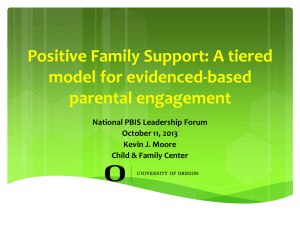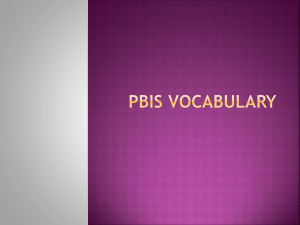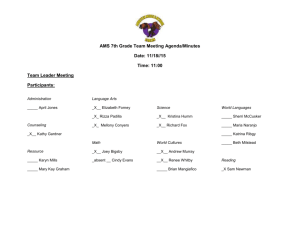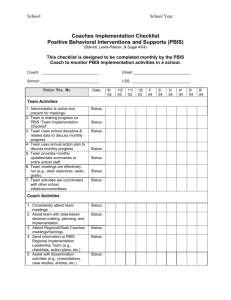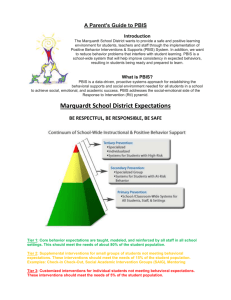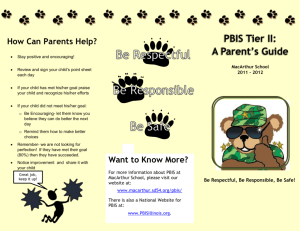Changing the Ecology of Youth Development
advertisement
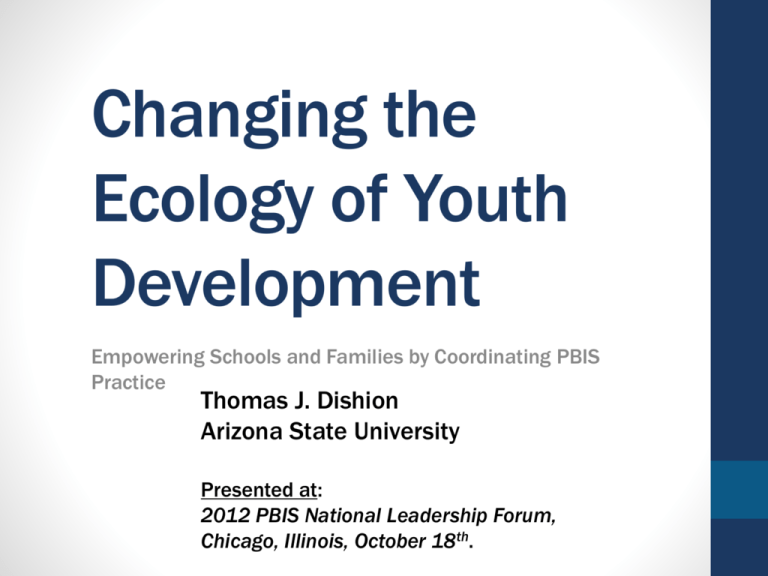
Changing the Ecology of Youth Development Empowering Schools and Families by Coordinating PBIS Practice Thomas J. Dishion Arizona State University Presented at: 2012 PBIS National Leadership Forum, Chicago, Illinois, October 18th. Three objectives of this talk: • Encourage educators to think and act ecologically, to design education strategies that are more effective, and less harmful. • To demonstrate that effectively engaging families in the public school context can make a difference in the success and well-being of students. • To discuss specific strategies that can be used within the PBIS structure to constructively engage parents to collaborate with educators. Thinking Ecological When Designing Interventions for Youth Ecological Framework: A Systemic View of Intervention Strategies. (Urie Bronfrenner 1989) Community Contexts Behavior Settings Population Density Racism, Oppression Relationships Teachers Schools Child cv Peers Poverty Adult Caregivers Neighborhoods Child Relevant Policies Families Ethnicity & Culture Lessons Learned: Possible Harm for Ecologically Insensitive Interventions The Adolescent Transitions Program Pilot Study Parent Focus Family Management Parent __ Child Teen Focus Self-Regulation Problem Behavior Antisocial Substance Use (Dishion & Andrews, 1995; Dishion, McCord & Poulin, 1999; Poulin et al, 2001) Teacher Reports of Delinquent Behavior at School: Unintended Peer Contagion in Group Interventions P P P P P P P P C P C P C C C C C C C C P C (Dodge, Dishion & Landford, 2006; Dishion & Tipsord, 2011) Other Interventions That May Have Unintended Side Effects: Community interventions that remove the youth for treatment, and then return her without any community supports. Interventions that support parents without attending to school adjustment. Interventions that target only youth behavior at school without collaborating with parents. Two Adult Sytems Concerned About Students Outcomes School Home Expectations Expectations Monitoring Monitoring Support Support What is What is Student Teacher-Parent going on at going on at Parent-Teacher Contact Contact school? home? Tracking Grades, Beh, Attendance Parent Awareness Behavior Expectations Homework Patterns School Awareness Early Childhood Problem Behavior Effective Family Management Interventions Reduce…. Middle Childhood Problem Behavior Adolescent Problem Behavior Challenges to Using Parenting Programs in Schools : • Respectfully identifying and engaging parents of students who most need the services and support; • Parents are often unable to participate in parenting ‘programs’ because they are delivered in groups and/or scheduling problems • Schools don’t have resources to pay for personnel engage and work with parents in these interventions; • There are often no formal strategies for linking work of parenting interventions with school based strategies; Unique Vulnerabilities of Secondary School Students: • Decreased parent involvement • Increased problem behavior • Increased peer group influence • Decreased attendance • Decreased academic performance An Overview of the Family Check-Up and Follow-Up Services Parent Support Materials The Family Check-Up Meet with Parent Family Assessment Feedback & Planning Parent PBS Training Student Intervention Support Community Resources Project Alliance Program Research on the FCU Model Dishion, Stormshak & Kavanagh Prevention Research in Public Middle Schools (Project Alliance 1 and 2: Dishion & Stormshak) 6th Grade Middle School Students: Portland Public Schools Randomly Assigned Family Resource Room Offered Family Check-up & FU support Control: Middle school as usual. 2 7th 7th ---> 11th Grade Self Reported Substance Use in the Last Month Intervention Outcome on Self Reported Substance Use for High Risk Students (adapted from Dishion, Kavanagh et al, 2002) Mediation of Reductions in Substance Use for Highest Risk Young Adolescents (adapted from Dishion, Nelson & Kavanagh, 2004) Randomized FCU in Middle School 6th grade Improved Parent Monitoring (observed) Reductions in Early Adolescent Drug Use 7th to 9th grade Self Report of Depression on the CDI Intervention Outcome on CDI Reports of Depression For High Risk Middle School Students (adapted from Connell & Dishion,2008) Percentage of the intervention group having contact with the parent consultant 60 50.1 Percentage of Families 50 40 30 24.2 25.6 Personal Contact Family Checkup 20 10 0 No Contact Percentage of Arrests at Each Age Police Documented Arrests from Age 11 through 17 as a Function of FCU Engagement. (Connell, Dishion et al, 2007). Ec 100 80 60 40 20 Ei N E 10 N=Non-engaged E=Engaged N 11 12 13 14 15 Age in Years 16 17 Preventive Effects on Growth in Alcohol Use by Intervention Engagement – Transition to High school 0.8 alcohol use (number of drinks) 0.7 0.6 0.5 0.4 control, engager treatment, engager 0.3 control, non-engager treatment, non-engager 0.2 0.1 0 6 7 8 9 grade Van Ryzin, Stormshak, & Dishion, 2012 Preventive Effects on Growth in Marijuana Use by Intervention Engagement – Transition to High school 6 Past month marijuana use 5 4 Noncomplier, Intervention 3 Complier, Control Complier, Intervention 2 1 -1.38 (.28), p < .05. 0 Time 1 Time 2 Time 3 Stormshak, Connell et al., 2011 GPA Intervention effects on GPA from early to late Adolescence (PAL 1) Stormshak, Connell, & Dishion 2009 Embedding Family Check-up Into PBIS Framework: Positive Family Support Model Department of Education Grant: Positive Family Support • Funding to work with 41 middle schools in Oregon, randomly assigned to immediate implementation of PFS, or delayed. • IES grant: R324A090111 • PFS will be adapted to unique needs/climate of each school • Key personnel at each school will be trained in the model • Our question: how can we add Positive Family Support to public middle schools that already have the PBIS infrastructure, without adding more work? PBIS & PFS School-Based Supports Individualized • Individualized supports • FBA Selected • Specialized support • Check-In/Check-Out PFS Core Components • WEB based Family Check-up •Parent management training •Parent support of intervention • Behavior change plan • Check in/ Check out • Email and Text messages Universal • School expectations • Positive reinforcement • Family Resource Center • Enhance school-family relationships • Parent screener • Parenting resources • (brochures/videos) Key Features of this Model • Follows a Response to Intervention approach • Designed to integrate into PBIS structures • Adapted to the unique ecology of each school • Partnership model: our intervention team and your school’s key personnel collaborate to learn the model Universal Family Support: The Family Resource Center Brochures, TV/DVD, Supplies Meeting Table, Computer, Coffee/Danishes on counter Parenting Resources: Brochures Proactive Screening that is Respectful to Parents” Revised Multiple Gating Approach Parent Readiness Screener (school entry) Teacher & Staff Readiness Screener (fall-spring) SchoolParent PBS plan Family Check Up Tailored Student & Family Support The Parent Readiness Screen for Positive Family Support. Begin the School Year with Parents Expressing THEIR Needs • Use Parent Readiness Screen to place students in the triangle • Use their data to guide your approach to contact parents Sixth Grade Parent Responses to the School Readiness Screener (N=3 schools) Item Description Doing Great Some Concern Serious Concern Asking for Support Completing Homework assignments 59% 30% 8.9% 11% Needing Structure and Supervision 65% 28% 6% 9% Getting easily distracted by other kids 51% 40% 10% 11% Focusing and staying on task at school 60% 33% 7% 9% Depressed or anxious 69% 25% 6% 7% Selected-Level: Behavior Change Plans Use Home Incentives Plan Check-In/ Check-Out Invite Parents to Join CI/CO For teachers & family resource specialists For parents and students (with teacher & family resource specialist help) For teachers and parents Worksheet for Preparing a Sensitive Parent Contact Worksheet for Positive Communication Practices in Parent-Teacher Meetings Worksheet Keeping Positive When Parents are Frustrated Video Support for Families Preliminary Results for Twenty Seven Schools (Half of the Sample) Medium to strong effects for increasing on the FamSET: School provides a School Readiness screener in fall Parents are proactive contacted before problem occurs School has defined system for regular school contacts Parents have input into school wide PBIS practices PBIS team invites parents to participate in student incentives Assessment-based feedback to parents Offer family-based services and educational material Work directly with parents to support PBIS strategies Follow up with parents about previously discussed concerns Number of resources offered parents in the schools PFS Acknowledgements Intervention Developers and Consultation Team • • • • • • • • Kimbree Brown Tom Dishion Rosemarie Downey Corrina Falkenstein Greg Fosco Kate Kavanagh Kevin Moore Beth Stormshak PFS Research Evaluation Research Team • • • • Carey Black Jeff Gau John Seeley Keith Smolkowski PFS Consultation Load: 1.5 FTE for 14 Public Middle Schools Dr. Kevin Moore Dr. Corrina Falkenstein Kimbree Brown, MS Summary and Conclusions • Effectively and respectfully engaging parents in school contexts with empirically validated interventions can increase student success. • PBIS provides an excellent infrastructure and behavior management structure for embedding parenting interventions into universal, selected and individualized intervention services. • We need to create an integrated system that includes parent engagement, so that there is ‘value added’, and we help school staff be more efficient and effective at what they are doing already. Some Future Directions • Begin to more systematically target peer learning environments and integrate knowledge about peer networking and contagion into the PBIS design • Continue to develop web-based assessment and intervention tools to enhance implementation success and to monitor outcomes continuously. • Provide more professional training in empirically support family interventions to all school staff, but especially school psychologists and school counselors as part of ‘basic training’. Achieving Educational Reform John F. Kennedy Thank you for your attention, have a great conference!! For more information on Positive Family Support Please contact Dr. Kevin Moore at kmoore2@uoregon.edu And visit the FCU and PFS website: (http://fcu.cfc.uoregon.edu/)
